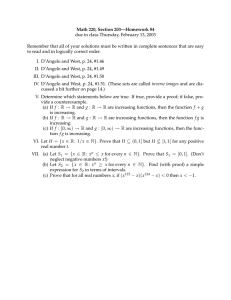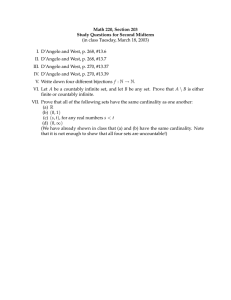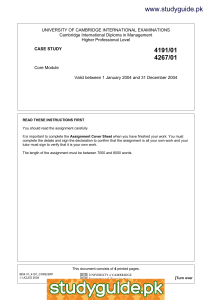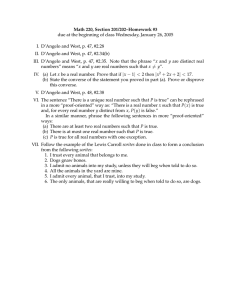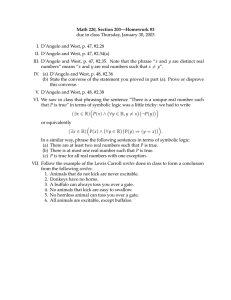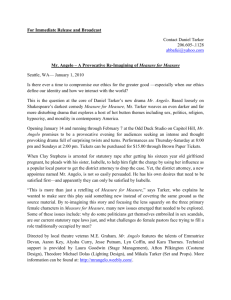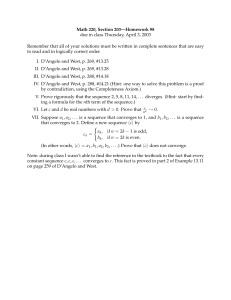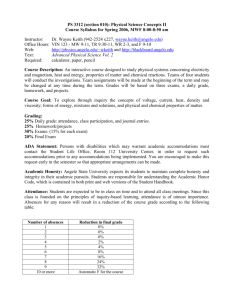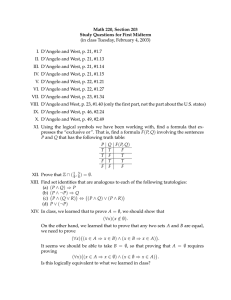www.XtremePapers.com
advertisement
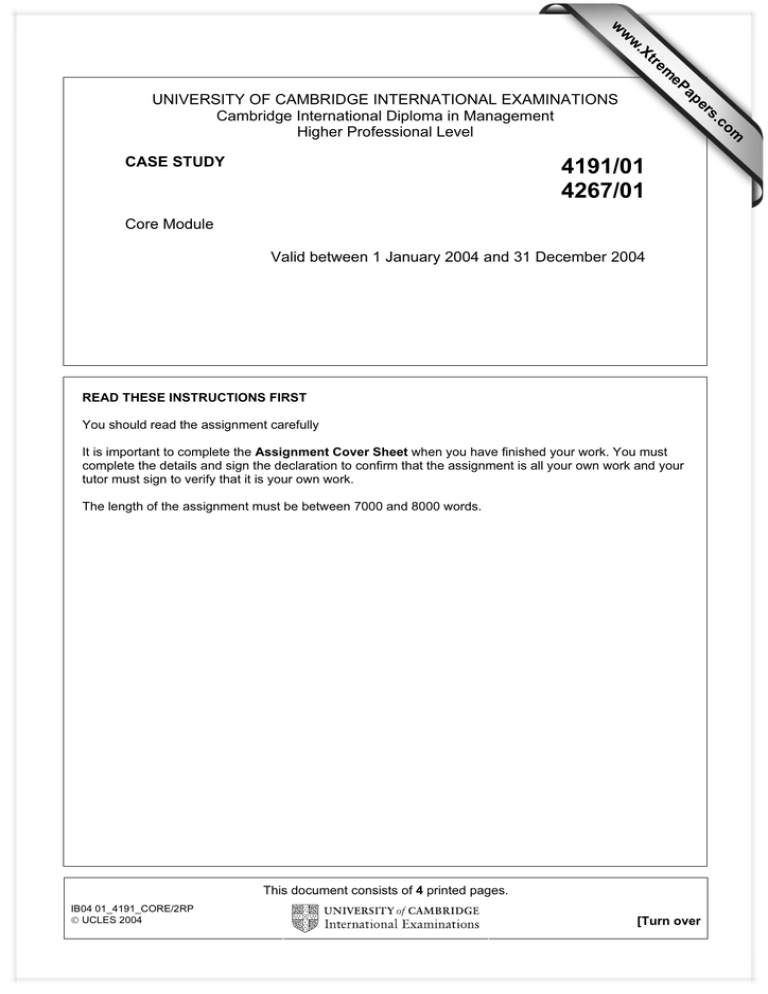
w w ap eP m e tr .X w om .c s er UNIVERSITY OF CAMBRIDGE INTERNATIONAL EXAMINATIONS Cambridge International Diploma in Management Higher Professional Level 4191/01 4267/01 CASE STUDY Core Module Valid between 1 January 2004 and 31 December 2004 READ THESE INSTRUCTIONS FIRST You should read the assignment carefully It is important to complete the Assignment Cover Sheet when you have finished your work. You must complete the details and sign the declaration to confirm that the assignment is all your own work and your tutor must sign to verify that it is your own work. The length of the assignment must be between 7000 and 8000 words. This document consists of 4 printed pages. IB04 01_4191_CORE/2RP UCLES 2004 [Turn over The Restaurant “Elegance” 2 For the past five years or so, the restaurant “Elegance” has been attracting a regular clientele, drawn by the quality of the menu and the “old world” charm of its surroundings. The restaurant is owned and managed by Robert and Angelo, who have been working together for ten years in all. Robert manages the restaurant in terms of the daily operation and Angelo is the chef. “Elegance” has developed a reputation for exactly that – elegance, with its reliance upon a menu of food cooked to order, using fresh ingredients and a narrow range of choices which are changed daily, according to the season. It operates only in the evening, generally by reservation, and offers a medium-priced tariff. The wine list is, again, small but of good quality, depending upon availability and current market options. This is not a fast food restaurant; the kitchen cooks to order and customers are aware that they may be waiting for some time for their meals. The wait, however, is generally considered worthwhile, and regular clients view the whole experience as a civilised time for relaxing and enjoying the company of others in quiet, rural surroundings. There are 40 covers (tables), which can usually provide 60 settings per night, if the restaurant is fully booked. The restaurant is open for six nights per week, Tuesday to Sunday, and runs at an average of 46% capacity, with lower usage at the beginning of the week, working towards higher levels on Friday and Saturday. The restaurant is staffed by local people, many of whom have been with the restaurant for the full five years. Robert and Angelo are considered very fair employers, who pay above the standard rates and who command a great deal of loyalty. Angelo has absolute control of the kitchen and spends time working with his small team, many of whom he has trained at the restaurant, in creating the menu, purchasing the food on a regular basis, and preparing the meals. Robert controls the wine list, and manages the restaurant staff outside the kitchen. He has a small team of regular staff, with some temporary staff brought in for seasonal work. The current operation seems to be fairly static, with a regular clientele coming to the established premises, knowing what to expect and appreciating the results. It is this predictability which attracts the current customers, who value the reliability of Robert and Angelo. Without a great deal of further work expanding the premises or increasing the tariff, Robert and Angelo cannot see how they can increase turnover or profits. Robert and Angelo lease the building itself at a fair market rent, and there are three years left to run. They have spent time and money on the fabric to create the right environment and facilities, aware that this is capital expenditure that will not be recovered. The restaurant operates at a healthy profit, with the current g.p.m. at 35%, after wages and running costs, but before tax and loan repayments. These bring the real annual net profit figure to €22,500. This figure has remained fairly constant over the past five years and Robert and Angelo have €112,500 which they now wish to invest in the business. They realise that there are choices, and that this investment money can operate as leverage. They are prepared to bank upon their reputation and experience and use this money to raise loans for expansion. UCLES 2004 4191/01 (Core) 2004 [Turn over 3 The options The first option is to re-invest the money into the current operation, through a capital programme, replacing and upgrading existing furniture and fittings in both the kitchen and dining areas. If this were the case, it would be a programme of preventative maintenance, as none of the main items actually needs replacing at the moment. If they decided, for example, to redecorate throughout, they would have to take a loss of earnings into account while the restaurant was closed for that period. They cannot, as leaseholders, extend the premises. The second option is to seek to purchase the building outright. Assuming the owners – a corporate investment company - wished to sell, the market price would be in the region of €450,000. The level of work to the fabric which Robert and Anglo have already undertaken should, of course, be taken into consideration when a final price is agreed. The third option, and one which is exciting Robert and Angelo, is to continue with “Elegance” as it currently stands and invest in a new venture in the country in which you live, which is one of the reasons why they are coming to you for advice. In your country there is some urban regeneration work taking place within a city near to where you live. Old riverside industrial premises are being renovated as smart, expensive urban office and living quarters, hoping to attract financial and service organisations. The keynote is regeneration, rather than rebuilding and much of the external façade of the buildings will be left. This means that there will still be a much older feel to the area than a modern development might have. This may or may not be attractive to the corporations which, it is hoped, will move there. To service this new area, there are a number of shops and restaurants being established, and this is what attracts Robert and Angelo. They expect the venture will be completely different from their existing business in at least the following ways: • There will be a different clientele, probably multi-ethnic, expecting a different level of service and outcome. • There will be the need to employ from a local labour force, of which neither Robert nor Angelo have any experience. • There will be different opening hours, a different menu and food selection, using, probably, a faster preparation and serving time. It is these differences which excite and concern Robert and Angelo, although they are aware of the enormous opportunity and potential of being in at the start. They have carried out some preliminary research and have found that all premises will be leasehold on a five-year term, with a guaranteed renewable option after the first term. The rental costs have yet to be fixed but are expected to be 25% higher than costs for similar urban premises which currently exist. UCLES 2004 4191/01 (Core) 2004 [Turn over 4 Your Role In the light of this third option, Robert and Angelo have come to you as a business consultant to seek your advice on which, if any, of these options they should take. Your role is to advise them on their business strategy over the next 3 – 5 years, using the information you have been given and that which you will need to research. Your report should be in the form of a strategic business plan for the next 12 months, taking into account more medium- and long-term requirements. You should address at least the following: • Regional trends in, for example, restaurant usage at the current time and how these might affect the market sector in your country where Robert and Angelo wish to operate. You should also consider other market sectors in which they may operate more profitably. • Procedures, processes and costs of establishing and maintaining a food establishment in an urban regeneration or development area within your country. This will include an awareness of legislation covering business development and financing of non-nationals wishing to set up businesses in your country. You should also advise on the viability of such plans. • Financial strategies which look to ensure long term stability and balance investment risk. You should use financial tools such as marginal or absorption costing to support your recommendations. Robert and Angelo will expect an appraisal of the three capital investment options and a strategy to maximize profit through investment. • Staffing strategies which make the best use of current staff expertise and prepare for development, including the employment of a local labour force in your country. • Justification of your strategic plan, through reference to real examples of local and global views on the business issues raised by the options open to Robert and Angelo. Please note the following: Information about the business which is not given may be assumed, and all such assumptions should be justified. You may provide a number of alternative strategies, depending upon the level of assumption and risk analysis you make. All strategies you suggest should be supportable through reference to calculation, research, examples and/or theoretical models. Your report, which should be in the form of a professional consultancy document, should be addressed to Robert and Angelo as a suggested strategic plan. University of Cambridge International Examinations is part of the University of Cambridge Local Examinations Syndicate (UCLES) which is itself a department of the University of Cambridge. UCLES 2004 4191/01 (Core) 2004
